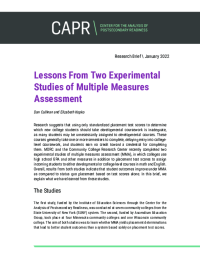Lessons from Two Experimental Studies of Multiple Measures Assessment

 Prior research suggests that using only standardized placement test scores to determine which new college students should take developmental coursework is inadequate, as many students may be unnecessarily assigned to developmental courses. MDRC and the Community College Research Center recently completed two experimental studies of multiple measures assessment, in which colleges use high school grade point averages (GPA), placement test scores, and other measures to assign incoming students to developmental or college-level courses in math and English. One study took place at seven State University of New York (SUNY) community colleges; the other study was conducted at four Minnesota community colleges and one Wisconsin community college.
Prior research suggests that using only standardized placement test scores to determine which new college students should take developmental coursework is inadequate, as many students may be unnecessarily assigned to developmental courses. MDRC and the Community College Research Center recently completed two experimental studies of multiple measures assessment, in which colleges use high school grade point averages (GPA), placement test scores, and other measures to assign incoming students to developmental or college-level courses in math and English. One study took place at seven State University of New York (SUNY) community colleges; the other study was conducted at four Minnesota community colleges and one Wisconsin community college.
Results from both studies indicate the student outcomes improve under multiple measures assessment as compared to status quo placement based on test scores alone. This brief describes findings from the studies and offers recommendations for institutions seeking to reform their assessment and placement practices. Here are the main findings:
- Students bumped up from developmental to college-level courses by multiple measures assessment were about 10 percentage points more likely to complete college-level courses after three semesters.
- High school cumulative GPA was the best observable predictor of success in college-level courses.
- The simpler multiple measures assessment system used in the Minnesota and Wisconsin study was less costly to implement and just as effective as the algorithm-based system used in the New York study.






